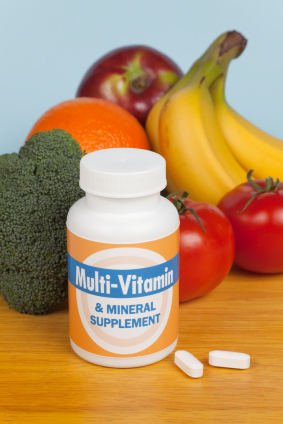Why Take Vitamins?
Why Take Vitamins?
By: Dr. George Obikoya
Vitamins are substances that are found in many of the foods we eat. Your body needs vitamins to work properly, which makes them some really important substances! Your body uses vitamins to do many things, like help you grow and develop. It needs vitamins to help your blood clot when you get a cut. Some vitamins help us make energy. Vitamins are even involved in making sure you can see in color, the world would look black and white without them! And if you've ever wondered what helps make your teeth healthy and strong, then you'll be sure to smile when you find out it's, guess what, vitamins!
Besides vitamins, there is also something similar called provitamins. A provitamin is similar in structure to a specific vitamin and can be converted to it by a few metabolic reactions, for example, beta-carotene can be converted to vitamin A; 7-dehydrocholesterol into vitamin D3. The amino acid tryptophan is called a precursor of the vitamin nicotinic acid because the conversion pathway is less direct than that of a provitamin.
Vitamins regulate metabolism reactions, in contrast to other dietary components known as macronutrients, for examples, fats, carbohydrates, proteins, which are the compounds utilized in the reactions regulated by the vitamins. Absence of a vitamin blocks one or more specific metabolic reactions in a cell and eventually may disrupt the metabolic balance within a cell and in our entire body. Vitamins contain no calories but play an essential role in your body. Think of vitamins kind of like the fluids in your car. If you have no oil (vitamins) in your car, it does not matter how much gasoline (calories) you put in your car, your car will not run. For this reason, it is critically important to ensure a proper supply of vitamins in your car. Unlike the oil in your car, many vitamins are purged from your body daily. A high-quality liquid multivitamin will replenish lost vitamins and minerals.
With the exception of vitamin C (ascorbic acid), all of the water-soluble vitamins assist enzymes that function in energy transfer or in the metabolism of fats, carbohydrates, and proteins. In other words, it will be difficult for our body to break down these nutrients into energy we can use without vitamins.
Some of the fat-soluble vitamins form part of the structure of biological membranes or assist in maintaining the integrity and functioning of these membranes. Some fat-soluble vitamins also may function at the genetic level to control the synthesis of certain enzymes. Fat-soluble vitamins are necessary for specific functions in highly differentiated cells.
A characteristic deficiency disease (or hypovitaminosis) results when we take an inadequate amount of a specific vitamin. The severity of this disease depends upon the degree of vitamin deprivation (see the figure below).
Symptoms of the disease may be specific such as functional night blindness when we take too little of vitamin A or nonspecific, for examples, loss of appetite and failure to grow. Some effects of vitamin deficiencies cannot be reversed by simply adding the vitamin to the diet, especially if damage to non-regenerative tissue such as cornea of the eye, nerve tissue, or calcified bone has occurred.
A vitamin deficiency may be "primary" (or dietary), in which case the dietary intake is lower than the normal requirement of the vitamin. A "secondary" (or conditioned) deficiency may occur (even though the dietary intake is adequate) if a pre-existing disease or state of stress is present such as malabsorption of food from the intestine, chronic alcoholism, repeated pregnancies and lactation. Many people today have micro deficiencies, in which they do not have clinical symptoms but they may suffer from difficulty concentrating, lack of energy, poor wound repair and a whole host of other mild, but cumulative symptoms.
When you take fat-soluble vitamins (A, D, E and K), the vitamins are stored in the fat tissues in your body and in your liver until your body needs them, some are stored for a few days, some for up to six months! Water-soluble vitamins such as Vitamin C and the B group of vitamins, on the other hand are different. They are not stored as much in your body. Instead, they travel through your bloodstream and whatever your body doesn't use comes out when you urinate. So these kinds of vitamins need to be replaced often, and many people fail to do so as in this case, often means daily.
Vitamins are, no doubt, absolutely critical for a healthy body and mind.

A good multivitamin is the foundation of health and nutrition. Take a look at our scientific reviews of many of the popular brands for factors such as ingredients, areas of improvement, quality level, and overall value. If you are looking for a high quality liquid multivitamin, we suggest that you take a look at the Multivitamin Product Comparisons.

